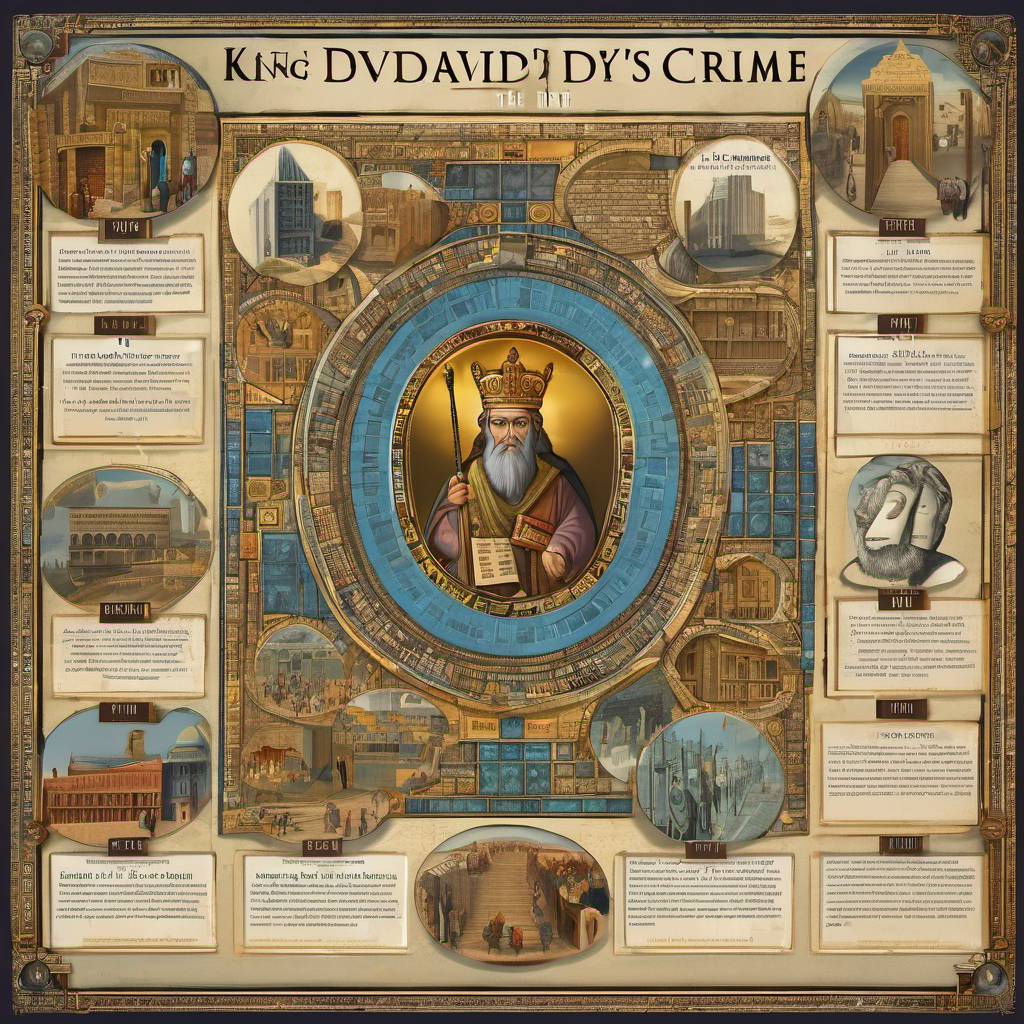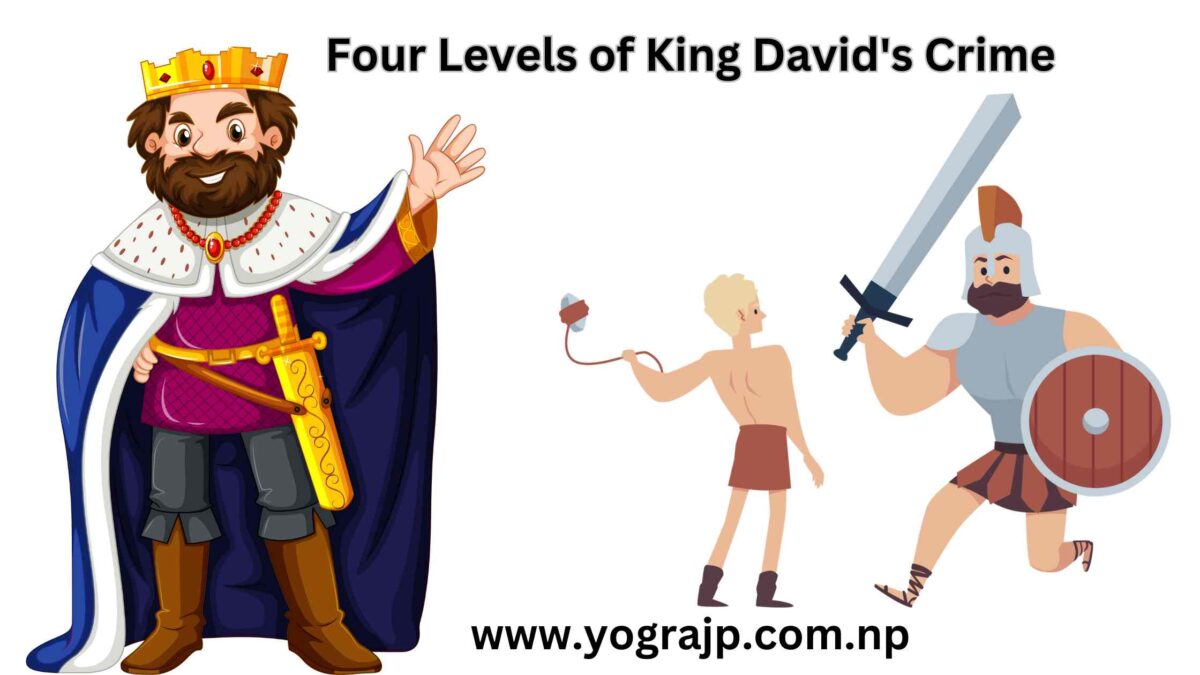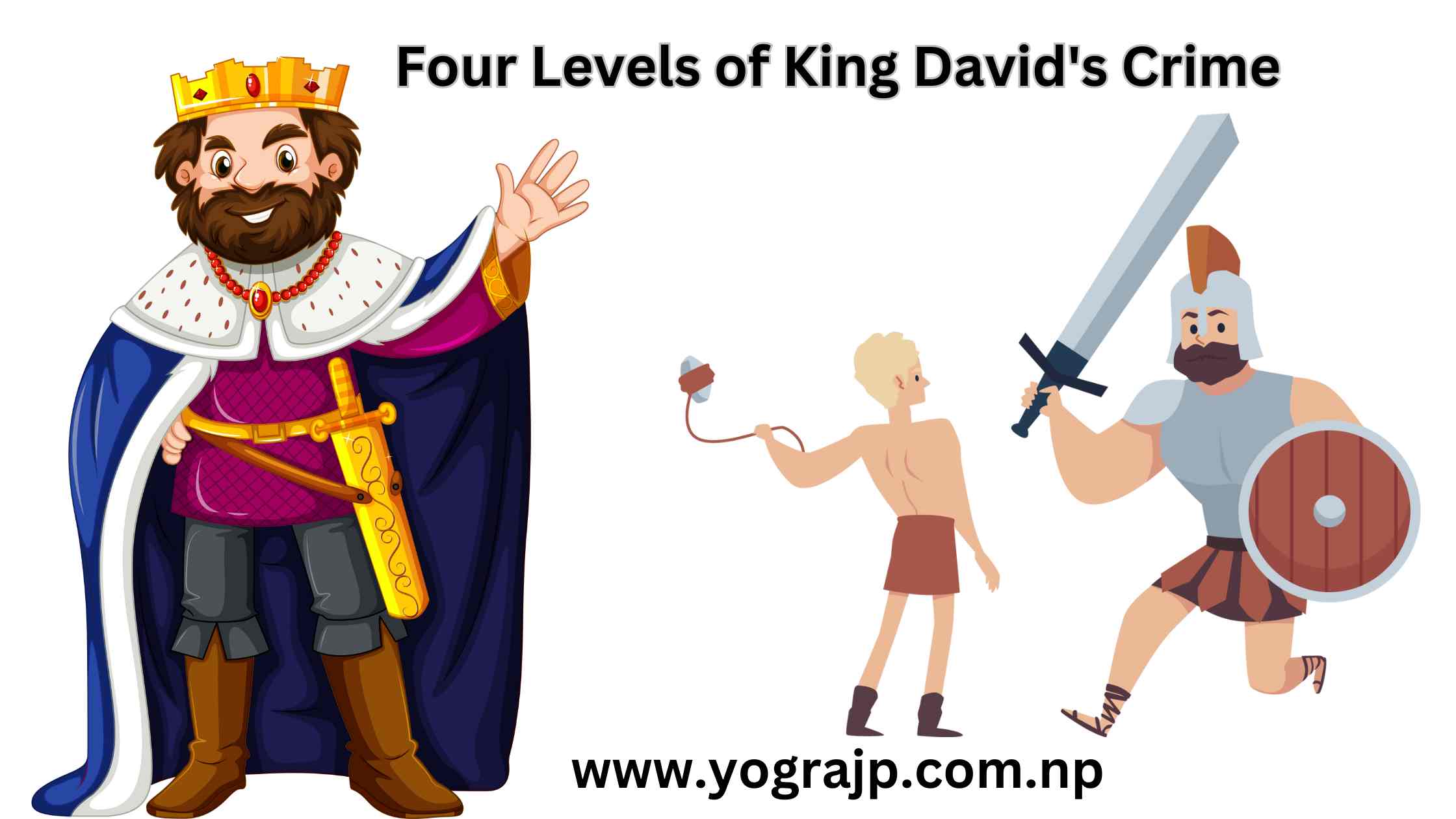Welcome to our blog post where we delve into the “Four Levels of King David’s Crime.” In this piece, we dissect the narrative of King David’s missteps, presenting it straightforwardly. Whether you’re drawn to history, fascinated by ancient lore, or simply intrigued by human narratives, we’re here to unpack King David’s actions. Join us as we navigate through the levels that shed light on and dissect this historical saga, striving to make the complexities of King David’s mistake understandable for all.
Four Levels of King David’s Crime

Literal Comprehension : Four Levels of King David’s Crime
The story ‘ Kings David’s crime ‘ had been taken from the ‘Holy Bible’. In this story, King David sends Joab to the battle with his commanders and servants & he stays in Jerusalem. In the evening David arose from his bed & walked upon the roof of King’s house, from the roof he saw a beautiful woman bathing herself.
One evening, David caught sight of Bathsheba, a wonderful woman bathing in her residence. The king, consumed by lust, inquired about her and discovered she was the wife of Uriah, one of his loyal soldiers. Disregarding this fact, David sent his men to bring Bathsheba to his palace, where he engaged in a physical relationship with her. Subsequently, she informed David of her pregnancy.
David’s actions revealed him as an immoral and unscrupulous king. Aware of Bathsheba’s marital ties to Uriah, a soldier fighting in the ongoing battle, David attempted to cover up his misdeed. He summoned Uriah from the battlefield, hoping he would unknowingly accept the child as his own. However, Uriah, dedicated to his duty, refused to indulge in comforts while his comrades were in the field.
To achieve his deceitful plan, David attempted to intoxicate Uriah, but the soldier remained vigilant, choosing to sleep at the palace entrance instead. Frustrated, David devised a sinister plot to have Uriah killed. He sent a letter to Joab, the commander, instructing him to place Uriah in the forefront of the most intense battle, resulting in Uriah’s death.
Upon receiving news of Uriah’s demise, Bathsheba mourned for her husband. Following the mourning period, David brought Bathsheba to his palace, making her his wife. Despite the temporary worldly gains, David’s immoral actions displeased God, highlighting the consequences of his transgressions.
Interpretation: Four Levels of King David’s Crime
The interpretation of “King David’s Crime” suggests a commentary on the dynamics of power, passion, and the double standards that exist in society. The narrative implies that individuals in positions of authority, such as rulers like King David, may wield their power unchecked and indulge in their desires without facing consequences. In contrast, ordinary citizens are expected to suppress their desires and are subject to punishment if they do not comply with the rulers’ whims.
The story reflects a broader theme of the abuse of power, where those in authority exploit their positions for personal gratification. It suggests that rulers may act with impunity, enjoying privileges that common citizens do not have. This could be seen as a critique of a societal structure where the powerful are exempt from the same moral standards and consequences as the rest of the population.
Furthermore, the narrative may convey a message about the manipulation and exploitation of individuals for the benefit of those in power. King David’s actions, using his soldiers and orchestrating a deceitful plan, highlight a disregard for the well-being of his subjects. This could be interpreted as a commentary on the sacrifices and injustices that ordinary citizens endure to satisfy the desires of their rulers
In essence, the story may serve as a cautionary tale or critique of a societal imbalance where rulers are free to act without accountability. At the same time, ordinary citizens bear the brunt of the consequences. It prompts reflection on the ethical considerations surrounding the exercise of power and the potential consequences of unchecked authority.
Read More: What is Product and Service Management?

Critical Thinking: Four Levels of King David’s Crime
This thought-provoking narrative provides a compelling glimpse into the intricacies of society, shedding light on the abuse of power and authority. The portrayal of King David’s actions as displeasing to God prompts us to ponder how we discern the divine’s approval or disapproval of our actions.
On one hand, the story masterfully captures the manipulation of power by rulers to fulfill personal desires. The narrative invites scrutiny of King David’s character—is he a virtuous ruler, and how do other leaders perceive him? If we approach the story from a political standpoint, divorcing it from moral judgments, it becomes an insightful commentary on the inherent weaknesses of humanity. It illustrates that even those in positions of great authority are not immune to the sway of their passions.
However, a critical perspective arises when contemplating the certainty with which the story attributes divine displeasure to King David’s actions. How can we confidently assert that our actions displease a higher power? This raises a broader inquiry into the subjective nature of moral judgment and the complexity of understanding divine will.
In essence, this narrative serves as a powerful catalyst for critical thinking, encouraging us to question the morality of rulers, the nature of power, and the validity of attributing divine displeasure to human actions. It prompts us to navigate the delicate balance between political pragmatism and moral accountability, challenging us to develop a nuanced understanding of the complexities inherent in both individual behavior and societal structures.

Read More: What is Management? Definition, Features, Principles, Functions, and Importance
Assimilation: Four Levels of King David’s Crime
This narrative has catalyzed personal introspection, offering valuable insights into self-awareness. It underscores the importance of discerning between admirable qualities and morally questionable actions, cautioning against blindly emulating even those considered great if their behavior is flawed. The theme of absolute power corrupting leadership resonates strongly, serving as a cautionary tale about the potential decay of an entire society when rulers succumb to corruption.
The parallel drawn between the narrative and the current state of the narrator’s country adds a poignant layer to the assimilation. The realization that immoral and undemocratic politicians prioritize personal gains over societal development resonates with the overarching message of the story. The decay in the narrator’s country is attributed to the misuse of power, echoing the narrative’s depiction of the negative consequences when rulers prioritize self-interest over the well-being of the society they govern.
This assimilation thus weaves personal growth and societal awareness into a cohesive narrative. It encourages a nuanced understanding of the complexities surrounding leadership and power dynamics, prompting a critical examination of both individual choices and broader societal structures. The story becomes a mirror reflecting not only personal behavior but also the broader implications for the health of a community when those in power prioritize personal gain over the common good.
Read More:
- 10 Best Essential Business Management Techniques You Need to Know
- Maximize Efficiency and Growth: Expert Product and Service Management Solutions
- Why Macroeconomics is the study of the economy as a whole – Best Info
- Understanding Supply and Demand: A Comprehensive Explanation
- The Nature and Scope of Macroeconomics- A Best Guide
Watch the Video in YouTube
FAQ
Q1.What was King David’s crime?
King David, a prominent figure in the Bible, committed several notable actions, including both righteous deeds and transgressions. One significant wrongdoing attributed to David is his affair with Bathsheba and the subsequent murder of her husband, Uriah the Hittite.
According to the biblical narrative in 2 Samuel 11, David saw Bathsheba bathing on a rooftop and lusted after her. He then arranged for her to come to him, and she became pregnant. To conceal his involvement, David attempted to manipulate Uriah by encouraging him to spend time with his wife, hoping that Uriah would believe the child was his own. When this plan failed, David ordered Uriah to be placed in the forefront of the battle, where he was killed.
David’s actions were condemned by the prophet Nathan, and David faced consequences for his sins. However, it’s essential to note that the Bible also emphasizes David’s repentance and God’s forgiveness toward him. Despite his flaws, David is often remembered as a man after God’s own heart, acknowledging the complexity of human nature and divine mercy in biblical narratives.
What did King David do?
King David, a central figure in the Bible, is known for various actions, both positive and negative. Here are some key aspects of King David’s life:
Shepherd and Musician: Before becoming king, David was a shepherd and a skilled musician. He gained favor with King Saul for playing the harp, which helped soothe Saul’s troubled spirit.
Victory over Goliath: One of the most famous stories about David is his victory over the Philistine giant Goliath. Using just a sling and a stone, David defeated Goliath and became a hero in Israel.
Friendship with Jonathan: David formed a deep friendship with Jonathan, Saul’s son. This friendship is often portrayed as a strong and loyal bond.
Anointed as King: Samuel, a prophet, anointed David as the future king of Israel while Saul was still reigning. This marked the beginning of David’s journey toward the throne.
Persecution by Saul: As David’s popularity grew, Saul became jealous and sought to kill him. David spent years on the run, gathering a band of loyal followers known as the “mighty men.”
Becoming King: After Saul’s death, David became the king of Judah, and later, the entire United Kingdom of Israel. He established Jerusalem as the capital and brought the Ark of the Covenant there.
Sin with Bathsheba: David’s affair with Bathsheba, the wife of Uriah, and his subsequent orchestration of Uriah’s death in battle is considered a grave sin. This event is detailed in 2 Samuel 11.
Repentance and Forgiveness: When confronted by the prophet Nathan, David repented of his sins. Despite his failings, David is known for his deep repentance and the forgiveness he received from God.
Military Successes: David was a successful military leader and expanded the territory of Israel during his reign.
Preparation for the Temple: While David desired to build a temple for God, he was told by the prophet Nathan that his son Solomon would be the one to undertake this task. David, however, made preparations and gathered materials for the future construction of the Temple.
Despite his flaws, David is often remembered as a significant figure in biblical history, and his legacy is celebrated in both Jewish and Christian traditions.
What were the challenges of David in the Bible?
King David faced numerous challenges throughout his life as recorded in the Bible. Here are some of the key challenges he encountered:
Goliath and the Philistines: Early in David’s life, he faced the giant Philistine warrior Goliath. Although he successfully defeated Goliath, it was a formidable challenge that required great courage.
Persecution by Saul: After his victory over Goliath, David’s popularity soared, and this fueled Saul’s jealousy. Saul, the reigning king, sought to kill David, leading to years of persecution and David living on the run.
Friendship and Family Struggles: David’s relationship with Saul’s son, Jonathan, was strong, but Saul’s jealousy strained that friendship. Additionally, David faced family challenges, including conflicts within his household.
Sin with Bathsheba: One of the most significant moral challenges David faced was his affair with Bathsheba, the wife of Uriah. This act of adultery and the subsequent arrangement of Uriah’s death brought about serious consequences for David and his family.
Rebellion of Absalom: David experienced a rebellion led by his son Absalom. Absalom sought to take the throne from his father, leading to a period of political turmoil and conflict within the kingdom.
Consequences of Sin: David’s sins, particularly the incident with Bathsheba and Uriah, had profound consequences. The child born from that affair died, and David faced internal family strife and external challenges as a result.
Leadership Struggles: As a king, David faced the responsibilities of leadership, including making decisions in times of war and peace. These decisions often came with their own set of challenges and consequences.
Grief and Mourning: David experienced personal grief, including the death of his son with Bathsheba. His emotional struggles and expressions of grief are reflected in various psalms attributed to him.
Despite these challenges, David is often portrayed as a man who sought God’s guidance, repented of his sins, and remained steadfast in his faith. The challenges he faced contributed to the complexity of his character as depicted in the biblical narrative.
Why was the Lord displeased with King David?
The Lord was displeased with King David primarily due to his actions involving Bathsheba and Uriah, as recorded in 2 Samuel 11-12 in the Bible.
The story goes as follows:
Adultery with Bathsheba: One evening, David saw Bathsheba, the wife of Uriah the Hittite, bathing on a rooftop. David, despite being married and having multiple wives, lusted after Bathsheba and committed adultery with her.
Arrangement of Uriah’s Death: When Bathsheba informed David that she was pregnant, David tried to cover up his sin. He summoned Uriah back from the battlefield, hoping that Uriah would sleep with Bathsheba and think the child was his. However, Uriah did not go home out of loyalty to his comrades still in battle. As a result, David arranged for Uriah to be placed in a dangerous position in the battle, where he was eventually killed.
Prophet Nathan’s Confrontation: The prophet Nathan confronted David with a parable about a rich man who took a poor man’s only lamb, leading David to express anger and a desire for justice. Nathan then revealed that David was the rich man in the story, and he had taken Uriah’s wife and orchestrated his death.
David, upon realizing the gravity of his sins, repented deeply. In 2 Samuel 12:13, David said to Nathan, “I have sinned against the Lord.” Despite his repentance, there were still consequences for David’s actions:
The child born to David and Bathsheba died.
The sword would never depart from David’s house, signifying ongoing conflicts within his family.
The Lord’s displeasure and the consequences of David’s actions were felt throughout his reign.
Although David’s repentance was genuine, the story illustrates the serious consequences of his actions. It serves as a reminder of the importance of righteousness and obedience in the eyes of the Lord.
Who were the wives of King David?
King David had multiple wives as mentioned in the Bible. Here are the names of some of his wives:
Michal: Michal was the daughter of King Saul and the first wife of David. Their marriage had its ups and downs, and at one point, she was taken away from David and given to another man. Later, she was returned to David.
Ahinoam of Jezreel: Ahinoam was one of David’s wives. She bore him at least two sons, Amnon and Kileab (also known as Daniel).
Abigail: Abigail was initially married to Nabal, but after Nabal’s death, David married her. Abigail is praised in the Bible for her wisdom and discretion. She bore David a son named Chileab.
Maacah: Maacah, also known as Maacah the daughter of Talmai, was the wife of David and the mother of Absalom.
Haggith: Haggith was another wife of David, and she bore him Adonijah.
Abital: Abital was one of David’s wives, and she bore him Shephatiah.
Eglah: Eglah was mentioned as one of David’s wives in the Bible, and she bore him Ithream.
These are the wives of David mentioned in the biblical narrative. It’s important to note that polygamy was practiced in ancient times, and having multiple wives was not uncommon among kings and prominent figures of that era.
How did the victims of King David’s crimes feel about him?
The specific feelings of the victims of King David’s actions, particularly Bathsheba and Uriah, are not explicitly detailed in the biblical narrative. However, we can infer certain emotions based on the events and the cultural context:
Bathsheba:
Bathsheba might have experienced a range of emotions, including vulnerability, shame, and possibly fear when she became pregnant. She may have been distressed by the circumstances of her affair with David.
After the death of her husband Uriah, Bathsheba became David’s wife. While the Bible does not provide explicit details about her feelings, it’s conceivable that she experienced a mix of emotions—grief for her late husband, the weight of societal judgment, and, potentially, the complexities of being married to the man responsible for her husband’s death.
Uriah:
Uriah the Hittite, who was loyal to David and the Israelite army, was unknowingly made a victim of David’s scheme to cover up his affair with Bathsheba. Uriah’s loyalty to his comrades and his commitment to duty were exploited, leading to his death.
Uriah likely did not have positive feelings about David’s actions, as he was deceived and used as part of a plan to conceal the king’s wrongdoing.
While the Bible provides details about the consequences of David’s actions, it doesn’t explicitly delve into the emotions of the victims. It’s important to recognize that the biblical narrative often focuses on the broader theological and moral lessons rather than providing extensive insights into the subjective feelings of individual characters.

